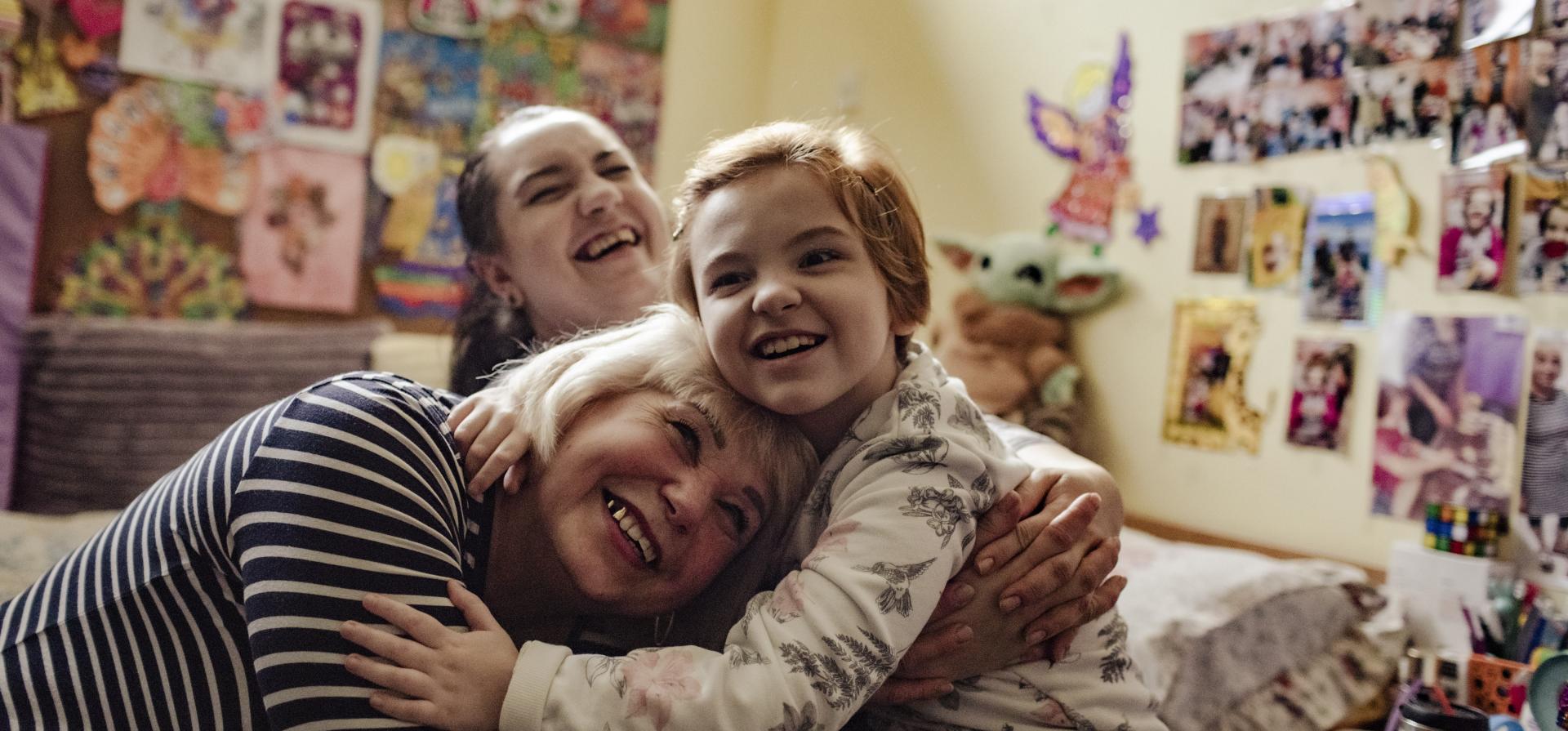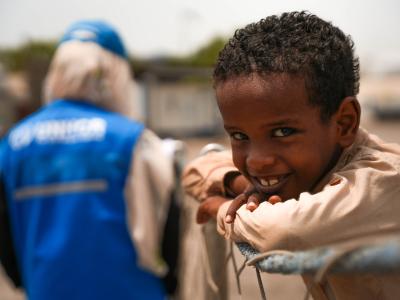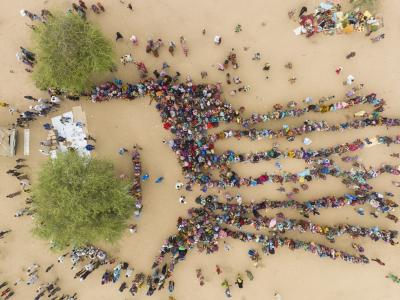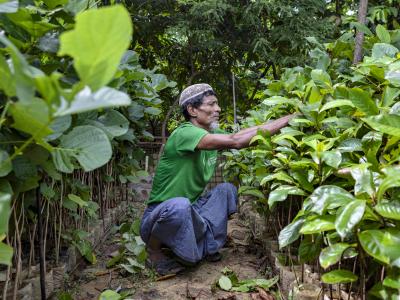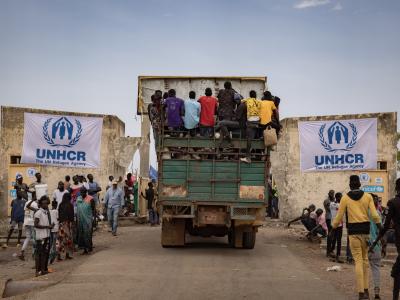Regional overview
By the end of 2023, the number of forcibly displaced and stateless people in Europe stood at 22.5 million, slightly up from 21.8 million in 2022.
Inside Ukraine, some 3.7 million people were internally displaced. Those who have fled frontline areas remain at risk from indiscriminate air strikes on civilian targets and infrastructure, while disrupted livelihoods and social services have left millions dependent on humanitarian aid. UNHCR reached 2.6 million people affected by the war inside Ukraine, with nearly 900,000 of the most vulnerable receiving cash assistance. Over 900,000 received winterization assistance, including cash top-ups, relief items, and care in collective sites. UNHCR supported the repair of over 27,500 homes and contributed to 95 inter-agency humanitarian convoys delivering vital humanitarian assistance to frontline and hard-to-reach areas.
Nearly 6 million refugees from Ukraine were registered across Europe, some under the European Union (EU)’s Temporary Protection Directive – which was extended until March 2025 – and others under similar national schemes. UNHCR helped 218,000 refugees with cash assistance, and over 380,000 people received protection services such as legal counselling and socio-economic inclusion support. UNHCR coordinated the efforts of 243 partners in the Regional Refugee Response Plan, contributing in meeting the immediate needs of refugees in 11 countries, while ensuring their longer-term inclusion in education, healthcare services, access to accommodation and employment. UNHCR began piloting a refugee housing solution in Poland, while a network of over 30 ‘Blue Dot hubs’ – information centres run by UNHCR, UNICEF and partners – reached nearly 300,000 people with information, services, and referrals for specific needs. With half of Ukrainian refugee children missing out on formal schooling in host countries, UNHCR issued recommendations to improve their access. UNHCR issued a Position on Voluntary Returns to Ukraine, urging host States to maintain protection and a flexible approach to refugees’ short-term visits to Ukraine, and for refugees’ legal status and associated rights in host countries to remain unaffected by visits lasting less than three months.
To advance community-based approaches to protection and refugee inclusion, UNHCR established the Regional Contact Centre in Hungary, a toll-free refugee helpline covering operations across Europe, which received 52,000 calls. A second iteration of the ‘Stay Safe’ campaign to raise awareness about the risks of trafficking and exploitation reached 7.9 million people. UNHCR managed 40 dedicated Help sites, which received 9.1 million hits, providing vital protection information across the region.
When earthquakes devastated south-east Türkiye in February 2023, UNHCR supported the Turkish Government's response with over 3 million core relief items including tents, beds and bedding, kitchen sets, hygiene kits and containers. Over 68,500 people benefited from UNHCR’s Specific Needs Fund cash assistance, while over 500,000 individuals were reached by UNHCR-funded protection activities, including legal counselling, referral to specialized services, and psychosocial support. UNHCR prioritized resettlement for vulnerable refugees affected by the earthquakes, many of whom were injured or lost family members, housing or livelihoods. Over 16,800 refugees were processed for resettlement, and over 13,900 – mostly Syrians – departed from Türkiye through resettlement in 2023.
An escalation in hostilities in the South Caucasus resulted in over 105,000 refugees leaving the Karabakh region for Armenia. Many arrived with acute protection needs following their sudden departure. UNHCR supported the humanitarian response led by the authorities in Armenia –who offered Temporary Protection to refugees – and coordinated the inter-agency Refugee Response Plan to deliver protection and assistance to refugees and host populations. UNHCR delivered nearly 90,000 items including beds, hygiene kits and kitchen sets to help vulnerable refugees cope with the cold winter months.
Some 270,200 refugees and migrants arrived in Europe by sea along the primary Mediterranean and Northwest African maritime routes, nearly 70% more than in 2022, further straining national reception capacities. Most arrived in Italy, though Greece and Spain saw the largest year-on-year increases. At least 4,100 people were reported dead or missing at sea, 36% more than in 2022. UNHCR and IOM repeated calls for urgent and decisive action to prevent tragedies such as that of the sinking of a boat near Pylos, Greece, in June in which hundreds perished, and following numerous other shipwrecks and fatal incidents along the primary maritime routes to Europe.
After years of calling for solidarity and responsibility-sharing, UNHCR welcomed the political agreement reached on the EU Pact on Migration and Asylum in late 2023 and continued to call for the implementation of protection-sensitive reforms that strengthen efficiency, while respecting and protecting the right to seek asylum in the EU.
As some States attempted to externalize their asylum obligations or introduce deterrent measures inconsistent with international law, UNHCR engaged with states and regional institutions, including the EU, to identify fair and equitable responses to migratory and refugee movements by taking a “route-based approach" encompassing countries of origin, transit and asylum.
In 2023, over 29,150 submissions were made globally to resettle refugees in Europe, and the region received over 15,500 refugees through resettlement.
UNHCR worked simultaneously with the private sector to expand refugee employment opportunities and remove obstacles to their financial inclusion, working with the European Banking Authority, European Commission, development actors, financial service providers, refugee-led organizations and NGOs.
Regional expenditure and budget
$1.047 billion spent against a budget of $1.694 billion
$647 million of unmet needs or 38% of the budget
Population overview
Financial overview
Trends in response
Multisectoral monitoring results
Protection

Child protection

Accountability to
affected populations

Basic needs


Shelter

Health

2.3 million people received protection services*
2022 result: 2.7 million
*Protection services encompasses a vast range of community-based, individual and household interventions in various domains of UNHCR protection work, including counselling and information on rights, sensitization on protection issues, community outreach and mobilization, specialized services for children or other persons with specific needs, GBV programming, legal assistance, registration and documentation, Refugee status determination and resettlement case-work, protection monitoring.
460,000 children received protection services*
2022 result: 795,800
86% of countries in the region had child protection services available to forcibly displaced and stateless children
*Child protection services include support through Best Interests Procedures for children at risk, targeted support for children with specific needs and children in alternative care, support through family tracing and reunification, and reintegration support for children associated with armed groups and forces.
66% of reporting countries had a multi-channel feedback and response system that was designed based on consultations with forcibly displaced and stateless people
2022 result: 60%
1.1 million people received cash assistance
2022 result: 2.0 million
1.5 million people received non-food items including core relief items*
Indicator not available in 2022
*This indicator reflects the total number of people who benefited from the direct distribution of in-kind non-food items, including domestic Core Relief Items (CRIs) and excluding shelter CRIs.
283,000 people received shelter and housing assistance*
Indicator not available in 2022
*Shelter and housing assistance includes emergency, transitional and durable shelter provision, collective shelter, shelter repair and maintenance, and rental programming.
287,000 people received mental health and psychosocial support services
2022 result: 77.200
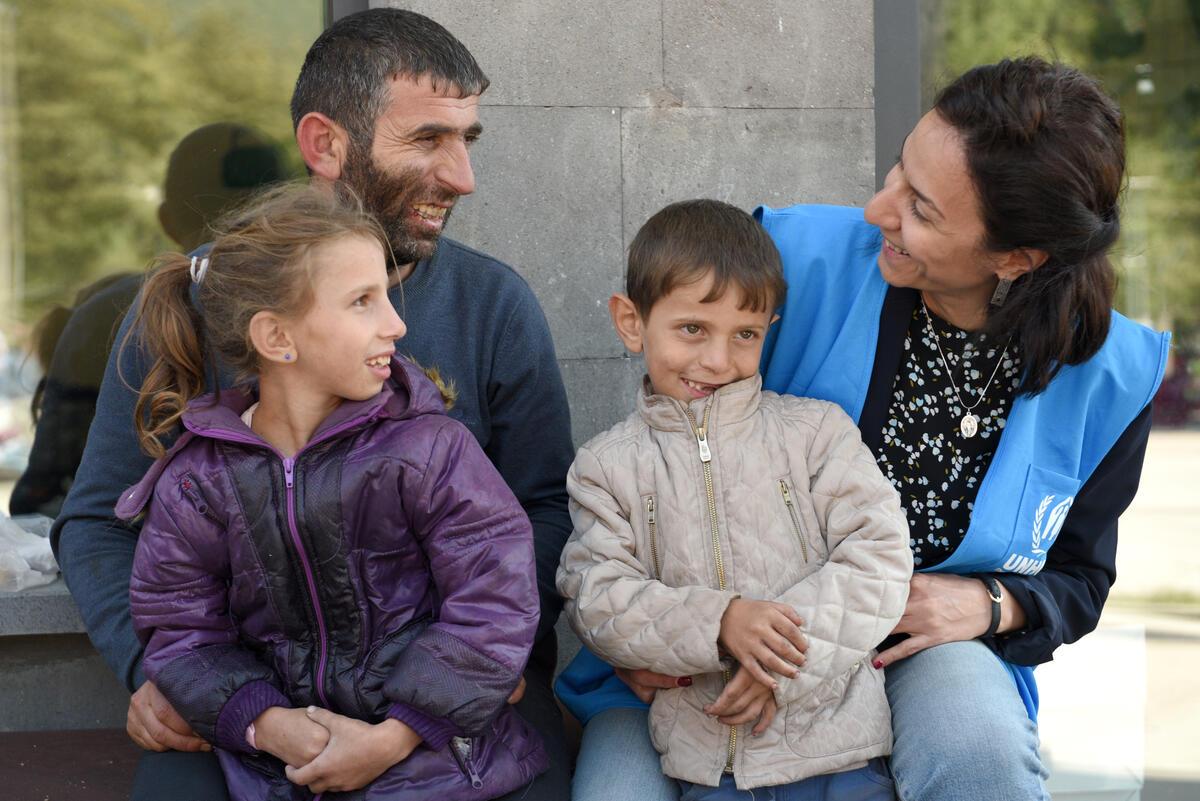

Swedish fashion firms show solidarity with displaced Ukrainians
Swedish fashion firms Gudrun Sjödén Group AB and H&M Group were among the many companies coming to the aid of displaced Ukrainians in 2023. Gudrun Sjödén Group AB ran a campaign to support UNHCR’s response in Ukraine by donating the proceeds from the sales of two dresses and one tote bag in 28 countries, which raised $614,000.
H&M, a longstanding partner to UNHCR, supported refugees by donating winter clothes valued at $1.5 million, which were distributed to forcibly displaced people in Ukraine and neighbouring countries, as well as in Armenia.
Situations
Western and Central Mediterranean situation
